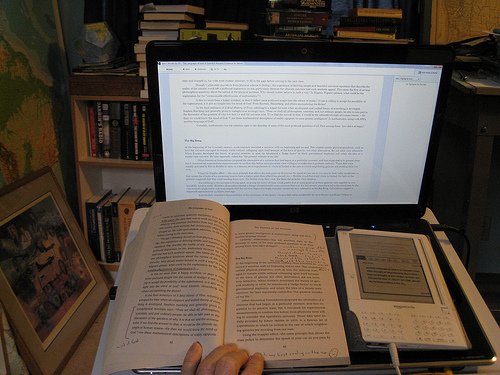Speed reading is a skill that is surprisingly easy to pump. You can improve your speed by using special software or by attending speed reading courses. In this article, we talk about 5 basic speed reading techniques that you can master yourself!
So, here they are:
By the way, many people have an even more terrible habit: to pronounce the text aloud when reading. This slows down the reading process more than speaking thoughts in your head. Subvocalization is a habit inherent in most people. When reading, we seem to "hear" all the words with our brain. Try to get rid of this habit and your reading speed will increase significantly! All you need to do is turn off the mechanism of pronouncing the text in your head. Try chewing gum while reading, mumbling to yourself (I checked on myself, it helps!) or even there is.
When we read, we tend to look back and stop at the word we just read. This slows us down considerably. Unfortunately, the only way to get rid of this habit is to admit that you do it and fix when you do it.
One of the most amazing techniques for speed reading is "meta guiding" (text tracking). Do you remember how at school, when reading a text, you moved your finger / pencil over it or followed it with the movement of your head? So, this story is about that. It turns out that this method seriously speeds up the reading process. Don't forget to concentrate on every word if you want to remember the incoming information.
Speed reading, in fact, is not shown to everyone. Most people are able to process a huge amount of read information at high speed, but there are also those who cannot. If you are interested, give speed reading a chance, but don't worry if it doesn't work out. There are other options:
Another trick that increases your reading speed is to skip unnecessary information. As former British Prime Minister Arthur James Balfour once said: «A person has only half the art of reading, if he has not added to it the ability to skip unnecessary text.»
Skipping unnecessary text is one of the methods of speed reading, and although this is not the best way for schoolchildren and students, but, for example, for scientists interested only in certain sections of a particular book, the method saves time perfectly. Professor David Davis shared his strategy for effective skimming:
1. Start with an introduction or a preface. Read them carefully to understand what the main feature of the book is and where the information you need is located.
2. Read the last chapter or conclusion.
3. Go through all the chapters and read the first and last paragraphs.
Obviously, you won't do that with every book. We don't recommend it. Skimming is best applied to those books in which you are not very interested in reading, or for a cursory acquaintance with the book and identifying the areas that interest you most for further detailed acquaintance with them.
When you are going somewhere, cooking or doing sports and other times when you can't read, listen to audiobooks. This is a great way to use time efficiently.

Last year, Jeff Ryan set himself a bar of 366 books that he had to read in a year. Such a goal seems incredible until you find out how Ryan achieved it:
The idea of reading one book a day from cover to cover quickly failed. There were days when Jeff was busy with work and raising children, and he didn't have a minute of free time to read. As a result, he used the method of parallel reading and eventually managed to complete his difficult challenge.
Of course, Jeff combined this tactic with others that we have cited here. The technique of reading several books at the same time implies that you can distinguish between the material being read and it does not merge into a continuous mess in your head. If there are signs of such behavior, adapt the method for yourself: read books of different genres and formats at the same time (for example: a comic book, a novel and an audiobook).
The advice seems obvious, but we will still focus on this point in more detail. So, if you have already read several chapters, and you do not feel pleasure or benefit from reading, then just stop reading it. Think about why you don't enjoy reading. Is it just the wrong book at the wrong time? If so, then just postpone it until better times. Someone recommended a book to you, and you don't like it? Return it to the seller, give it to him or give it to the library. Don't waste your precious time on books you don't like.
Take a look at the books you want to read. Using the methods described above, you will master them in less time. Set yourself a reading schedule and go ahead!